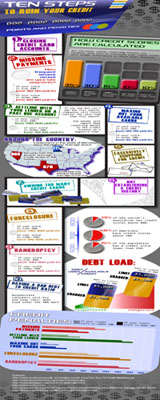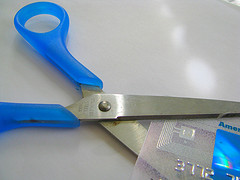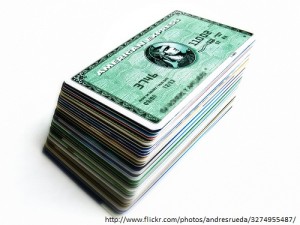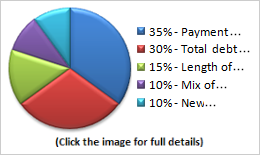Home > Credit history management
Credit history management
Can Debit Cards Hurt Your Credit Score?
Since the credit crunch, more people have decided to use debit cards instead of credit cards for their purchases. On one hand, using debit cards can be smarter since the transactions come straight from your checking account – you don’t have to repay a credit card balance. But, there may be some drawbacks to using your debit card; your credit score could be affected.
What Affects Your Credit Score
Using a debit card in itself isn’t going to affect your credit score. Your checking account activity isn’t normally listed on your credit report. Even overdrafts don’t appear on your credit report unless the account gets closed and you never pay back the delinquent balance. Of course, that’s a stretch. You need your checking account so you’ll probably clear up any overdrafts quickly and your credit score won’t get hurt in that way.
What does happen when you choose your debit card for purchases is that your credit card gets neglected. After your credit card is inactive for several months, the credit scoring calculation ignores that account on your credit report. If this account has a good amount of available credit, your credit utilization could go up and your credit score will drop. Fortunately, all you have to do to reactive your credit card is use it. Once your account becomes active again, the credit scoring calculation will once again include that account in your credit score.
Credit card issuers don’t like inactive credit card accounts. In fact, your credit card issuer could close your account if it remains dormant for several months. A closed credit card would affect your account in the same way as an inactive account. The difference is Read more…
Quick and Easy Ways to Wreck Your Credit Score
Failing to make your payments on time will lower your credit score, but that may be the only reason that appeals to common sense. Stranger ways to lose points abound.
 It takes years to build up a good credit score, but very little effort to trash it. In fact, sometimes it is the actions you take to manage your credit more responsibly that lower your score. Obviously, missing payments affects your score negatively, as it should.
It takes years to build up a good credit score, but very little effort to trash it. In fact, sometimes it is the actions you take to manage your credit more responsibly that lower your score. Obviously, missing payments affects your score negatively, as it should.
If you have several cards and aren’t using them, you might naturally think that getting rid of available credit and loans would show how responsible you are, and get you a nod of approval from the credit police, wouldn’t you? Actually, the opposite is true. Closing card accounts lowers your available credit, so the ratio between any debt you have and the amount you can make use of becomes higher. This is known as your debt to credit ratio, or debt load.
Say you have three credit cards, each with a $1,000 credit limit. That means you have $3,000 available to you. If you charge $1,000 on one card, your debt load is now $1,000 from $3,000, or 33.3% So now you have a monthly payment, and realize that by the time you get it all paid off (depending on your interest rate), you are going to pay $1,400 for $1,000 worth of stuff you didn’t really have to have after all.
You’re thinking like a grown-up now. Proud of your new awareness, you cut up one of your other cards since you will never be so frivolous as to charge $3,000 worth of stuff. You call the bank and Read more…
When Your Spouse’s Credit Affects Yours
 When two people get married, a lot of things combine, but credit histories and credit scores aren’t one of them. So, if you’re marrying someone who has bad credit, you don’t have to worry that their bad credit will drag yours down simply because you’ve been joined in holy matrimony. You do have to worry, however, if you’re applying for joint credit together, if your spouse has access to your accounts, or if your spouse has bad spending habits.
When two people get married, a lot of things combine, but credit histories and credit scores aren’t one of them. So, if you’re marrying someone who has bad credit, you don’t have to worry that their bad credit will drag yours down simply because you’ve been joined in holy matrimony. You do have to worry, however, if you’re applying for joint credit together, if your spouse has access to your accounts, or if your spouse has bad spending habits.
Applying for Joint Credit
Now that you’re married, there may be times when you apply for a credit card or loan with your spouse. For example, you may get a joint credit card if your spouse can’t qualify for one alone, to help your spouse repair their credit, or to make household accounting easier. Unfortunately, your spouse’s bad credit may keep you from qualifying for the best credit cards and you could wind up with a high interest rate, high fee credit card.
Applying for mortgages or car loans together will also prove difficult. Lenders have various ways of considering a joint applicant’s credit score. They may take an average of your scores or they may consider only the lowest credit score. Rarely, if ever, do they only count the highest credit score. This means you could qualify for a smaller loan, have a high down payment requirement, or have to pay a higher interest rate on the loan.
Adding a Spouse To Your Accounts
There’s a possibility that your spouse has bad credit because they have bad credit habits. If you add this spouse to your credit card accounts, their bad credit habits will Read more…
Should I Cancel My Credit Cards to Eliminate My Debts?
 During the process for repairing your credit, debt reduction with the goal of debt elimination is the typical starting place for most consumers. Credit card debt is often the biggest problem in the credit repair equation since missed and late payments or too much credit card debt is the reason your credit needs to be repaired in the first place.
During the process for repairing your credit, debt reduction with the goal of debt elimination is the typical starting place for most consumers. Credit card debt is often the biggest problem in the credit repair equation since missed and late payments or too much credit card debt is the reason your credit needs to be repaired in the first place.
Immediately when learning credit cards are maxed out and bills are too high to pay, many consumers will instinctively want to cancel their credit cards to help them resist the spending temptations which got them in trouble in the first place. But canceling credit cards is one of the biggest credit repair mistakes people can make and doing so, especially to multiple accounts, can be devastating to your credit score.
Here are some things you need to consider about credit cards and credit repair:
Oldest and Dearest Cards Mean Most
The credit card account you opened first means the most to your credit score. Part of the calculation for determining your three digit credit score is the amount of time for which you have established credit. By closing the oldest credit card account, you are essentially erasing part of your credit history which can drop your credit score. Read more…
Why You Shouldn’t Let Old Accounts Fall Off Credit Reports
When repairing your credit, you have to take the initiative and see what is being reported to the credit bureaus. You may find after checking your credit report that you owe some old debts from years gone by. It can be tempting to continue ignoring these debts since the creditor has not pursued them but doing so can be bad for your credit score.
Repay for Repair?
Some debtors choose to let debts fall from their credit reports after seven years since the time they stopped making payments on their account. They wait for the time to have past rather than spend the money to repay the original debt. While it is true that old debts will expire from the report and you’ll have saved yourself some money, there is no guarantee it will not hurt your credit. Read more…
Credit Repair Don’t: Dispute Everything On Your Credit Report
When you repair your credit, there are steps you must take to ensure your credit history is correct and always up to date, otherwise it can reflect poorly on your credit score. In order to keep accurate information contained in your report, you may need to file a dispute to the credit reporting bureaus to correct the error. But be cautious – if you try to dispute data by yourself, make sure that is in fact true or your dispute may be dismissed as frivolous.
How Investigations Work
The credit reporting bureaus receive data from creditors on a monthly basis. The information shows how you manage your credit, pay your bills, the amount of credit you are extended and have used, and the type of account you have. The credit bureaus take this information and compile it into a history report. Because the data is managed by humans, there is always a chance some of the information may be reported incorrectly. A consumer has a responsibility to check their information and make sure it is correct. They can do this by order a copy of their credit report and reviewing each detail.
humans, there is always a chance some of the information may be reported incorrectly. A consumer has a responsibility to check their information and make sure it is correct. They can do this by order a copy of their credit report and reviewing each detail.
Once a consumer notices errors, they should complete the credit bureaus form for filing a dispute. The information that is incorrect should be reported to the bureau which will then lead to an investigation by the credit reporting agency. The bureau will then contact the creditor with questions about the information being reported. During a 30 day period the creditor must respond with the corrected information, prove the information is being reported as accurate, or they may not respond at all. If corrected information is provided, the credit bureau will change it on the report for the consumer. If the information is accurate, the consumer will be alerted. If the creditor does not reply at all, the information will be eliminated from the consumer’s report. Consumers will receive written correspondence with the results of the investigation that details any action taken. Truth be told, it can be a tedious process.
In the event you were denied credit due to incorrect information being reported, the consumer credit bureau will send a corrected copy of your credit report to anyone that had received a copy of your report within a two year time frame. In order to instigate this action, a consumer must request this be done in writing by the consumer.
Disputing Real Issues
There are some inexperienced agencies that will attempt to file disputes on all of your credit information in the hopes some creditors will not respond and the information will be eliminated, which is discouraged. Only a handful of credit repairing agencies have the expertise and experience to be able to decipher what should be disputed and what should be left alone.
If doing it yourself, remember that the credit reporting agency has the right to refuse an investigation if they feel the dispute is frivolous, so you should be well informed before attempting. If you have several legitimate disputes, you should file them as soon as you have discovered the inaccurate information. However, keep in mind that filing too many disputes in an effort to have information removed can be detrimental to your credit repair success.
Once a dispute is filed, be sure to follow up regularly to ensure the information is correct. Many consumers will make the mistake of doing the initial work and letting the rest fall by the wayside. If inaccurate information remains on your credit report, your score will not improve.
Too Many Disputes Could Be “Frivolous”
If you send too many disputes at one time, the credit bureau can decide these disputes are frivolous and refuse to process the disputes. The law allows them to do this. When this happens, none of your disputes are processed and nothing is removed from your credit report.
The only exception is when you’ve been a victim of identity theft and none of the accounts on your credit report belong to you. Even then, you should have documentation, like an ID theft report or affidavit, showing that the accounts were fraudulently opened. Read more…
How Do You Close Out Credit Card Accounts?
While it is never advisable to close out all of your credit card accounts simultaneously, it can be good practice to downsize the amount of credit you have in order to repair your credit score. The key to closing accounts is to do it correctly. Otherwise, it can end up harming your credit in the long run.
Here are 7 steps to take when you want to close out your credit card accounts for good:
1. Decide Your Route
If you are interested in closing accounts because you have too many cards, you may want to consider which cards you truly no longer need. Never close the accounts you have had for the longest period of time. Doing so can decrease your credit score and make repairing your credit harder, since the length of time you have had the account is a factor in determining your credit score. Close only the accounts you do not use that have been opened recently. Read more…
Why Closing Your Credit Card Accounts Doesn’t Always Make Sense?
 When the credit card chaos erupted in the last few years and people finally began to realize the damage they were doing to their credit scores by overextending their credit, many made the mistake of shutting down credit card accounts completely. It was thought that closing the accounts would end the temptations of spending more.
When the credit card chaos erupted in the last few years and people finally began to realize the damage they were doing to their credit scores by overextending their credit, many made the mistake of shutting down credit card accounts completely. It was thought that closing the accounts would end the temptations of spending more.
However, as people paid more attention to their credit histories and worked hard to repair their credit scores, they realized that closing their card accounts was a mistake. They had actually hurt their scores by taking away part of their credit histories and made credit repair harder. Read more…







Let's connect!